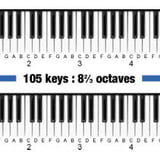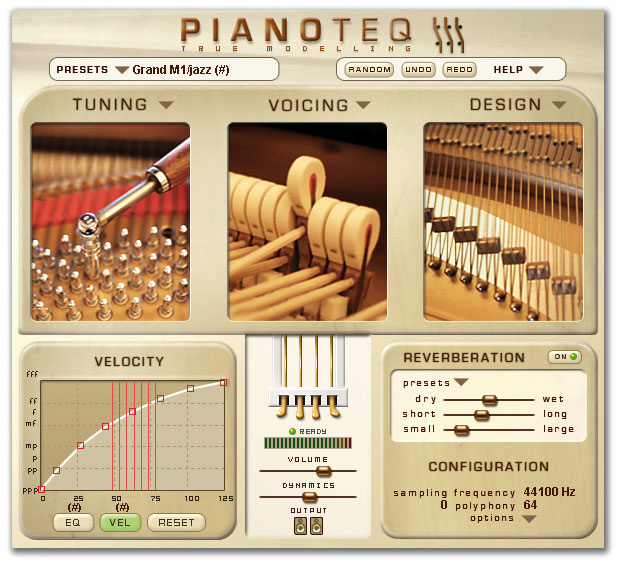

playing Bass Marimba in the low range, Xylophone in the upper range and mixing both together in the middle range. The Layering feature allows you to mix several instruments, e.g. In the audio examples below, Dynamic Morphing refers to the fact that the percentage of the various instruments is dynamically modified while playing, whereas it is fixed in the Static Morphing examples. The timbre of the morphed instrument you create is the one of an imaginary acoustic instrument whose physical parameters lie somewhere in between those of the instruments from which you started building the morphing. This new technology handles the morphing at the physical modelling level, providing a stunning acoustic authenticity to instruments that never existed. However these are three of the many instruments you can create with the acoustic Morphing introduced in Pianoteq 7 (Standard and PRO). Instruments VibraDrum, CimbaHarp or GlockenTines for sure do not exist. The new New York Steinway Model D for Pianoteq accompanies the existing Hamburg Steinway D and provides the famous Steinway concert piano sound with superb musical expression. The reference piano was the very first produced of Steinway’s groundbreaking new flagship instrument - the Model D Spirio|r, and has been used by some of the most famous pianists in the world today. In collaboration with Steinway & Sons, Modartt has recorded a beautiful new Model D Concert Grand at the famous New York Steinway Hall. New grand piano modelled after a New York Steinway Model D All pianos in Pianoteq 7 are constructed and revoiced using this new physical model. It also allows longer sustain, particularly in the bass range, with notes lasting up to a couple of minutes, just like on a real acoustic piano. The new physical model allows more complex tones to be produced, and as observed by a pianist, the sound becomes "three-dimensional". parallel or perpendicular to the soundboard. It consists in modelling string vibrations that can take any direction, e.g. Modartt introduces a new refinement in its physical model: the double polarization. Listen to audio demos Refined physical model The difference between Morphing and Layering is that in the latter the two sounds are mixed together, whereas in Morphing the instrument Physics itself is being morphed. On popular demand, Modartt adds a new layering feature in Pianoteq 7 (Standard/PRO) allowing to mix several instruments, e.g. This innovative technology handles the morphing at the physical modelling level, providing stunning acoustic authenticity to instruments that never existed. These are however three of the many instruments you can create with the acoustic Morphing introduced in Pianoteq 7 (Standard/PRO). The instruments XyloHarp, VibraDrum or GlockenTines certainly do not exist. Since the Celeste Pedal is continuous, it lets you adjust the thickness of the felt. It is based on the improved Celeste Pedal which makes use of a virtual felt strip that is interposed between hammers and strings to achieve a softer, and more delicate, sound. What's new in version 7 Felt presets with improved Celeste Pedal (available as from version 7.4)Ī new ‘Felt’ preset is added to all contemporary pianos. Up to 48 kHz in PIANOTEQ Stage and Standard.

MODARTT PIANOTEQ 5 REVIEW PRO
PIANOTEQ PRO offers an internal sample rate of up to 192 kHz. Presets built with PIANOTEQ PRO can be loaded in PIANOTEQ Standard without limitation. In PIANOTEQ Stage, preset loading is limited to parameters that are present in the interface. You can purchase additional instrument packs at any time. These instrument packs are fully working whereas remaining instrument packs are available in demo mode for your evaluation. During registration, you can choose two instrument packs with the Stage version, three with the Standard version and four with the PRO version. Note-per-note edit: all other physical parametersĬoncerns new purchases from 2019 onward. Note-per-note edit: volume, detune, attack envelope


 0 kommentar(er)
0 kommentar(er)
